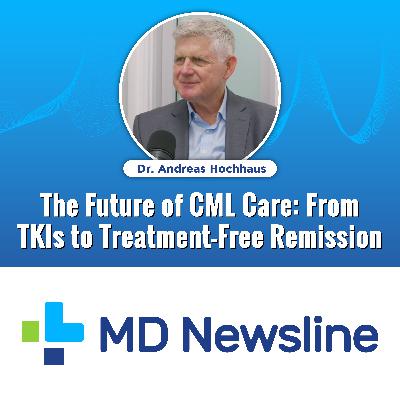What's New in Bladder, Prostate, and Kidney Cancer Treatment
Description
In this episode of MD Newsline, Dr. Karine Tawagi, a genitourinary medical oncologist at the University of Illinois in Chicago, shares cutting-edge updates from ASCO 2024 related to bladder, prostate, and kidney cancers. Dr. Tawagi explores the clinical implications of circulating tumor DNA (CT DNA), discusses evolving bladder preservation strategies, and addresses the expanding role of PARP inhibitors in prostate cancer. She also emphasizes the importance of equitable access to new therapies and multidisciplinary collaboration in cancer care.
Episode Highlights
Advances in Bladder Cancer Management
Dr. Tawagi reviews the Niagara study, which integrates dervalumab immunotherapy with standard cisplatin-based chemotherapy. This new regimen has become a standard of care for cisplatin-eligible patients with muscle-invasive bladder cancer. She also discusses ongoing trials and the promise of bladder preservation, especially for patients concerned about quality of life post-cystectomy.
The Power of CT DNA in Personalizing Treatment
CT DNA is emerging as a powerful prognostic tool in bladder cancer, with potential use in escalating or de-escalating treatments based on molecular response. Dr. Tawagi discusses its role in both neoadjuvant and metastatic settings, including trials like the MODERN study.
PARP Inhibitors in Prostate Cancer
For prostate cancer patients with homologous recombination repair mutations—especially BRCA1/2—Dr. Tawagi highlights the role of PARP inhibitors such as niraparib and the Amplitude trial's results in the castration-sensitive setting. She discusses the ongoing debate around sequencing, survival outcomes, and access.
Kidney Cancer and Immunotherapy
An update from the Keynote 564 trial shows continued benefit of adjuvant pembrolizumab for high-risk localized kidney cancer. Dr. Tawagi underscores the importance of patient counseling using risk calculators and timely referral to oncology after nephrectomy.
The Importance of Multidisciplinary Care
Dr. Tawagi emphasizes collaboration among urologists, radiation oncologists, medical oncologists, and other specialties to deliver optimal, patient-centered care. She calls for increased awareness of trial updates and improved access to novel therapies across diverse populations.
Key Takeaway
Dr. Tawagi emphasizes that the future of genitourinary oncology lies in individualized treatment informed by biomarkers like CT DNA, equitable access to novel therapies, and strong multidisciplinary collaboration to enhance outcomes and preserve quality of life.
Resources
Website: https://mdnewsline.com/
Newsletter: https://mdnewsline.com/subscribe/
Connect with Dr. Karine Tawagi: Here
























